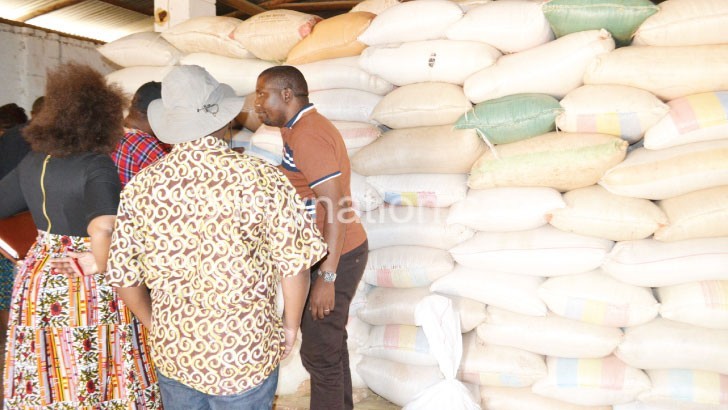Silent cry of a nandolo farmer
It is the onset of the 2017/18 rainy season and farmers are busy preparing their gardens hoping for a good harvest and better prices.
For Patson Kamwendo, from Chikapa Village in Mwanza District, gone are the times farmers grew maize alone. Besides the staple, the 42-year-old farmer planted some pigeon peas (nandolo) which were expected to fetch higher prices due to the unmet appetite for legumes in India. He visualised himself getting no less than K300 per kilogramme if Agricultural Development and Marketing Corporation (Admarc) started buying the commodity shortly after harvesting.

“For a commodity that does not need too much rains or fertiliser, it would be a jackpot. I did not have to spend much on farm inputs for the six to seven months the crop was in the garden,” he says.
In the maize fields, the crop was wilting due to dry spells, with leaves and stems being devoured by fall armyworms. The double tragedy has left nearly 3.3 million people in the country grappling with food shortage, according to Malawi Vulnerability Assessment Committee (Mvac).
But Kamwendo was not worried much. The pigeon peas were not affected. Seven months later, he harvested 15 bags. If he got a good price, he would use the proceeds to buy food.
The major heartbreak for the farmer is that he is still keeping them in his house, refusing to sell his harvest for “peanuts”. While waiting for Mwanza Admarc markets to open the buying season, vendors and private traders from towns inundated the rural locality to buy pigeon peas at as low as K70 a kilogramme.
This is why Kamwendo was over the moon when President Peter Mutharika ordered Admarc to start buying nandolo at K230 a kilogramme.
“What a relief it was!” he says, perching on a wooden chair. “We were so happy when we heard the new price. We had been planning for the payday way before the markets opened. Life is hard. We were looking forward to selling our produce at a good price.”
But was the long wait worth it?
“Unfortunately, the markets are dry. When we go there, we are told there is no money for buying the commodity. We, farmers, are told so when we go to Mwanza Admarc to sell the pigeon peas,” he says.
The situation is pushing farmers to sell their commodity at a giveaway price to an influx of vendors in nandolo-growing districts who offer K70 to K130 per kilogramme.
“We need money to feed ourselves, so the only option is to just sell it to the vendors who come here. Surprisingly, when they take our nandolo to the Admarc depots, they are being told there is money. When we go there, we are told there is no money,” says Kamwendo.
The rural farmers say they cannot keep clinging to their perishable produce, hoping to sell to Admarc.
Group village head Chikapa confirmed the sentiments, saying Admarc is giving farmers in his area a raw deal.
“Nandolo farmers have not benefited from their sweat,” she says. “Last year we sold at very low prices. This year, farmers have not profited from growing the crop. Instead, it is vendors who are benefitting as has been the case in the past. Due to frustration, we just shelve our commodity and see it being destroyed by weevils.”
Chikapa said an Admarc depot, located just a kilometre from her home, only opened for three days following the presidential order.
“Ever since, it was never opened again, except when the vendors bring bulks of what they steal from farmers,” she says.
Commenting on the rip-off, Nandolo Farmers Association chairperson Susan Chimbayo urges government and Admarc to put in place checks and balances for the benefit of nandolo farmers who do the donkey work.
“The major issue is that the directive the President made did not benefit farmers, but vendors and other private traders,” she says.
However, Admarc acting chief executive officer Margaret Roka Mauwa says all markets have been buying directly from the farmers.
“Normally, the farmers bring the produce to the markets. So, the issue that we are only buying from private traders is not true. Our findings show that all commodities are being bought from smallholder farmers because we went to have an interface with individual farmers,” she says.
Recently, the Parliamentary Committee on Agriculture went to Mwanza to investigate the discrepancies in nandolo marketing.
According to committee chairperson Joseph Chidanti Malunga, the legislators want the marketing season suspended because “there is no noticeable improvement” in addressing the discrepancies impoverishing the farmers.
“Probably the timing was bad. If the situation is like that everywhere else, we might just recommend that this programme be discontinued,” he says.
Malunga belongs to the United Transformation Party (UTM) whose leader, Vice-President Saulos Chilima, promised to ensure Admarc markets open soon after harvest if he wins the Presidency in May 21 2019 Tripartite Elections.
The farmers feel Mutharika is playing politics by using their crop and on-off Admarc markets to counter the sentiments by his Vice-President
“Mwanza is the fourth district the committee visited. We have been to Balaka, Thyolo, and Neno, where the situation is not different,” said Malunga.





